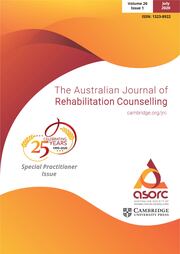Article contents
Comparing and Contrasting Employers' Concerns on People with Substance Abuse in Beijing, Hong Kong and Chicago
Published online by Cambridge University Press: 15 October 2015
Abstract
The study explored and compared employers' concerns on hiring individuals with substance abuse in Chinese and Western work settings. One hundred employers from Beijing (n = 30), Hong Kong (n = 30), and Chicago (n = 40) were randomly recruited from small-sized firms and interviewed using a semi-structured interview guideline. The interview considered the following aspects: backgrounds of employers, their business and employees, hiring process and considerations, and hiring concerns towards people with substance abuse. Data were analysed using frequency count approach. Employers' concerns on hiring individuals with substance abuse in Beijing and Hong Kong focused more on communication abilities. In contrast, employers in Chicago focused more on job performance and productivity.
- Type
- Articles
- Information
- The Australian Journal of Rehabilitation Counselling , Volume 16 , Issue 1 , 01 May 2010 , pp. 45 - 53
- Copyright
- Copyright © Cambridge University Press 2010
- 2
- Cited by


